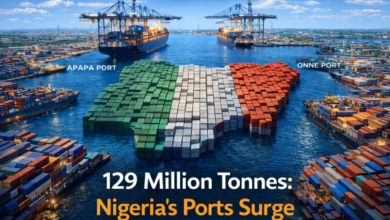Customs Unveils One-Stop-Shop to Cut Port Dwell Time to 48 Hours

Nigeria has taken another decisive step toward modernising its maritime trade ecosystem as the Nigeria Customs Service (NCS) launches its long-awaited One-Stop-Shop (OSS) — a unified, technology-driven platform designed to simplify cargo interventions, strengthen transparency, and dramatically accelerate trade facilitation across the nation’s seaports.
The landmark system, unveiled in Apapa by Assistant Comptroller-General (ACG) Mohammed Babandede, Zonal Coordinator, Zone A, represents one of the boldest reforms yet in the drive to harmonise port processes and eliminate the chronic bottlenecks that undermine Nigeria’s competitiveness in global logistics.
A Centralised Digital Nerve Centre for Cargo Clearance
Positioned as a single command hub that brings all required Customs units together under one operational roof, the OSS is engineered to replace the fragmented, file-passing, multi-desk culture that has historically slowed clearance and increased opportunities for interference.
Babandede described the OSS as “a centralised framework for joint review, coordinated examination, and unified decision-making on all flagged or non-compliant declarations.”
In practical terms, this means:
- All intervention units collaborate in one location
- Real-time data and documentation are shared instantly
- Traders have a single point of engagement
- Fewer delays, fewer disputes, fewer touchpoints
The goal? Reduce cargo dwell time to an average of 48 hours per shipment — a benchmark that, if achieved, radically elevates Nigeria’s standing in global trade efficiency rankings.
A Critical Support System for the B’Odogwu Digital Platform
The OSS is also fully aligned with — and complementary to — the Customs’ celebrated B’Odogwu digital platform, a modernisation tool already credited with streamlining documentation and enhancing risk management.
With the integration of the One-Stop-Shop (OSS):
- Real-time analytics
- Centralised case management
- Unified documentation
- Transparent workflow tracking
…are now seamlessly combined, giving Nigeria’s ports a digital backbone similar to those in Dubai, Morocco, Singapore, and Rotterdam.
This is a major stride toward world-class automation.
Cost Savings for Businesses and Greater Accountability
For port users long burdened by demurrage, storage charges, and the uncertainty of multi-stage reviews, the OSS is expected to deliver immediate economic benefits:
Key Business Advantages
- Lower demurrage costs as shipment release accelerates
- Fewer operational delays and predictable timelines
- Reduced human contact — lowering risks of rent-seeking
- Greater confidence for importers and exporters
- Enhanced compliance due to clearer visibility of processes
Customs leadership emphasised that transparency is the backbone of the platform: every flagged declaration will now be reviewed collaboratively, eliminating the shadowy back-and-forth that often characterised manual processes.
Integrity Will Determine Success, Customs Warns
While commending the NCS-ICT team for building the platform in-house, ACG Babandede stressed that the system’s effectiveness will ultimately depend on the conduct of those using it.
“The OSS is only as strong as the integrity of its implementation,” he said, urging officers and port users to adopt the process wholeheartedly.
In a sector long plagued by delays, duplications, and conflicting directives, the call for discipline and responsible engagement is both timely and strategic.
Strong Stakeholder Support From Port Community
The launch event brought together the key pillars of Nigeria’s port value chain, including:
- Comptroller Emmanuel Oshoba, Apapa Command
- Comptroller Frank Onyeka, Tin-Can Island Port
- Comptroller Peter Ntadi, Western Marine Command
- Terminal operators
- Customs agents & licensed brokers
- Freight forwarder associations
- Maritime trade organisations
Early reactions from port users and logistics operators have been overwhelmingly positive, describing the OSS as “the kind of innovation needed to truly unlock trade efficiency.”
BRANDECONOMY Analysis: A Strategic Leap Toward Port Competitiveness
The One-Stop-Shop initiative is more than an administrative tool — it is a competitive strategy.
Across global trade corridors, speed is currency.
Nigeria loses billions annually to delays, demurrage, port gridlock, and supply chain inefficiencies. With West and Central African neighbours upgrading their own systems, Nigeria must accelerate reforms to protect its market share.
The OSS:
- Reduces clearance duplication
- Standards aligns Nigeria with global best practices
- Improves ease of doing business
- Strengthens Nigeria’s attractiveness for foreign shipping lines
- Supports the Marine & Blue Economy agenda
If fully implemented and monitored, it could become one of the most impactful port reforms in decades.
Conclusion: A Turning Point for Nigeria’s Maritime Trade Future
With the rollout of the One-Stop-Shop, the Nigeria Customs Service signals its readiness to usher Nigeria into a new era of fast, transparent, and globally competitive port operations.
For importers, exporters, shipping lines, terminal operators, and logistics players, the OSS promises not just procedural change but systemic transformation — one that could finally unlock the full economic potential of Nigeria’s maritime sector.










